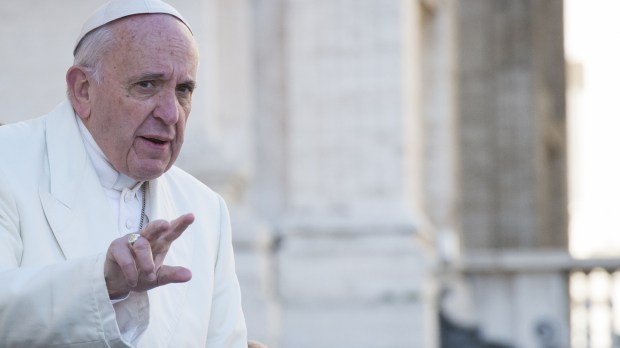Drawing on a phrase he has often used in his pontificate, Pope Francis today warned again of “ideological colonization,” saying that it does not allow differences, and sins against the Creator, eventually requiring the witness of martyrdom.
The pope offered his reflection in his homily at Mass today in Santa Marta, drawing on the First Reading, which recounts the martyrdom of Eleazar, who gave his life rather than defy the law and eat pork.
The pope noted that there are three main types of persecution, Vatican Radio reported: a purely religious persecution; a “mixed” persecution that has both religious and political motivations, like the Thirty Years War or the St. Bartholomew’s Day Massacre,” and a kind of cultural persecution, when a new culture arrives, wanting “to make everything new and to make a clean break with everything [of the past]: the cultures, the laws and the religions of a people.” It is this last type of persecution that led to the martyrdom of Eleazar.
The Holy Father noted how the persecution that led to Eleazar’s death came in this way. Some of the Jews wanted to imitate the power of the Greek king, and so proposed introducing pagan institutions to their own people.
Not necessarily the ideas or gods of those nations, the pope noted, but the institutions. In this way, these people brought in a new culture, “new institutions” in order to make a clean break with everything: their “culture, religion, law.”
The pope said that a key in this process is a “perverse root:”
And this is the path of cultural colonization that ends up persecuting believers too. But we do not have to go too far to see some examples: we think of the genocides of the last century, which was a new cultural thing: [Trying to make] everyone equal; [so that] there is no place for differences, there is no place for others, there is no place for God. It is the perverse root. Faced with this cultural colonization, which arises from the perversity of an ideological root, Eleazar himself has become [a contrary] root.
In fact, Eleazar dies thinking of the young people, leaving them a noble example. “He gives [his] life; for love of God and of the law he is made a root for the future.” So, in the face of that perverse root that produces this ideological and cultural colonization, “there is this other root that gives [his] life for the future to grow.”
What had come from the kingdom of Antioch was a novelty. But not all new things are bad, the pope said: just think of the Gospel of Jesus, which was a novelty. When it comes to novelties, the pope said, one has to be able to make distinctions:
There is a need to discern ‘the new things’: Is this new thing from the Lord, does it come from the Holy Spirit, is it rooted in God? Or does this newness come from a perverse root? But before, [for example] yes, it was a sin to kill children; but today it is not a problem—this is a perverse novelty. Yesterday, the differences were clear, as God made it, creation was respected; but today [people say] we are a little modern… you act… you understand … things are not so different … and things are mixed together.
The “new things” of God, on the other hand, never make “a negotiation” but grow and look at the future:
Ideological and cultural colonizations only look to the present; they deny the past, and do not look to the future. They live in the moment, not in time, and so they can’t promise us anything. And with this attitude of making everyone equal and cancelling out differences, they commit, they make a particularly ugly blasphemy against God the Creator. Every time a cultural and ideological colonization comes along, it sins against God the Creator because it wants to change Creation as it was made by Him. And against this fact that has occurred so often in history, there is only one medicine: bearing witness, that is, martyrdom.
Eleazar, in fact, gives the witness by giving his life, considering the inheritance he will leave by his example: “I have lived thus. Yes, I dialogue with those who think otherwise, but my testimony is thus, according to the law of God.” Eleazar does not think about leaving behind money or anything of that kind, but looks to the future, “the legacy of his testimony,” to that testimony that would be “a promise of fruitfulness for the young.” It becomes, therefore, a root to give life to others.
And the pope concluded with the hope that that example “will help us in moments of confusion in the face of the cultural and spiritual colonization that is being proposed to us.”

